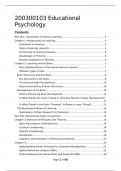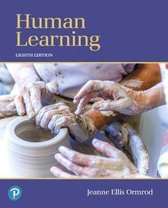Samenvatting
Samenvatting Human Learning - Educational Psychology ()
NL: Complete samenvatting van de hoofdstukken voor de toets van het Educational Psychology van de UU. Ongeveer 90% van alle begrippen staan dikgedrukt en duidelijk aangegeven, samen met uitleg, voorbeelden en benodigde afbeeldingen. EN: Complete summary of the chapters for the UU Educational...
[Meer zien]





